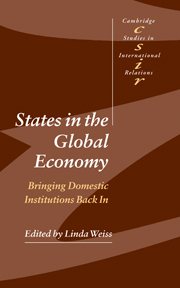Book contents
- Frontmatter
- Contents
- List of figures
- List of tables
- List of contributors
- Preface
- 1 Introduction: bringing domestic institutions back in
- Part I The resilience of welfare states
- Part II New economic challenges, changing state capacities
- Part III Governing globalisation
- 11 Managing openness in India: the social construction of a globalist narrative
- 12 Guiding globalisation in East Asia: new roles for old developmental states
- 13 Governing global finance: financial derivatives, liberal states, and transformative capacity
- 14 Is the state being ‘transformed’ by globalisation?
- List of references
- Index
- CAMBRIDGE STUDIES IN INTERNATIONAL RELATIONS
11 - Managing openness in India: the social construction of a globalist narrative
Published online by Cambridge University Press: 22 September 2009
- Frontmatter
- Contents
- List of figures
- List of tables
- List of contributors
- Preface
- 1 Introduction: bringing domestic institutions back in
- Part I The resilience of welfare states
- Part II New economic challenges, changing state capacities
- Part III Governing globalisation
- 11 Managing openness in India: the social construction of a globalist narrative
- 12 Guiding globalisation in East Asia: new roles for old developmental states
- 13 Governing global finance: financial derivatives, liberal states, and transformative capacity
- 14 Is the state being ‘transformed’ by globalisation?
- List of references
- Index
- CAMBRIDGE STUDIES IN INTERNATIONAL RELATIONS
Summary
Why does a state like India continue policies oriented towards economic openness despite unfavourable domestic political and social conditions? Conventional explanations emphasise the role of technology, economic crisis, and the influence of multinational agencies and corporations. In doing so, these accounts conflate the causes of economic opening with its maintenance or continuity, shifting the agency away from the state and its institutions. Ontologically, in addition, research on globalisation tends to focus on change, whether it is in business practices, technology, social policy, culture, or state capacity. Continuity seems either taken for granted or uninteresting.
It makes sense to separate continuity from either cause or change as a distinct subject of inquiry. There is nothing inherent about a triggering event (cause) that assures policy continuity. In fact, it is the continued management of economic openness – whether it is through active intervention, deniable tacit support, or an explicit hands-off approach – that illustrates most starkly the state's role in promoting globalisation. Works by Eric Helleiner (1994), Ethan Kapstein (1994), Louis Pauly (1997), and Linda Weiss (1998), in this vein, underscore the state's industrial and financial policy interventions. Equally important, but less evident, is the state's effort at constructing an enabling narrative in support of its policies. Policy statements, speeches, publications, debate, academic and professional training, historiography – all of these entail rhetorical exercises that cumulate in creating an environment to either support or discourage cross-platform consensus on openness, or on any other significant policy stance for that matter.
- Type
- Chapter
- Information
- States in the Global EconomyBringing Domestic Institutions Back In, pp. 225 - 244Publisher: Cambridge University PressPrint publication year: 2003

